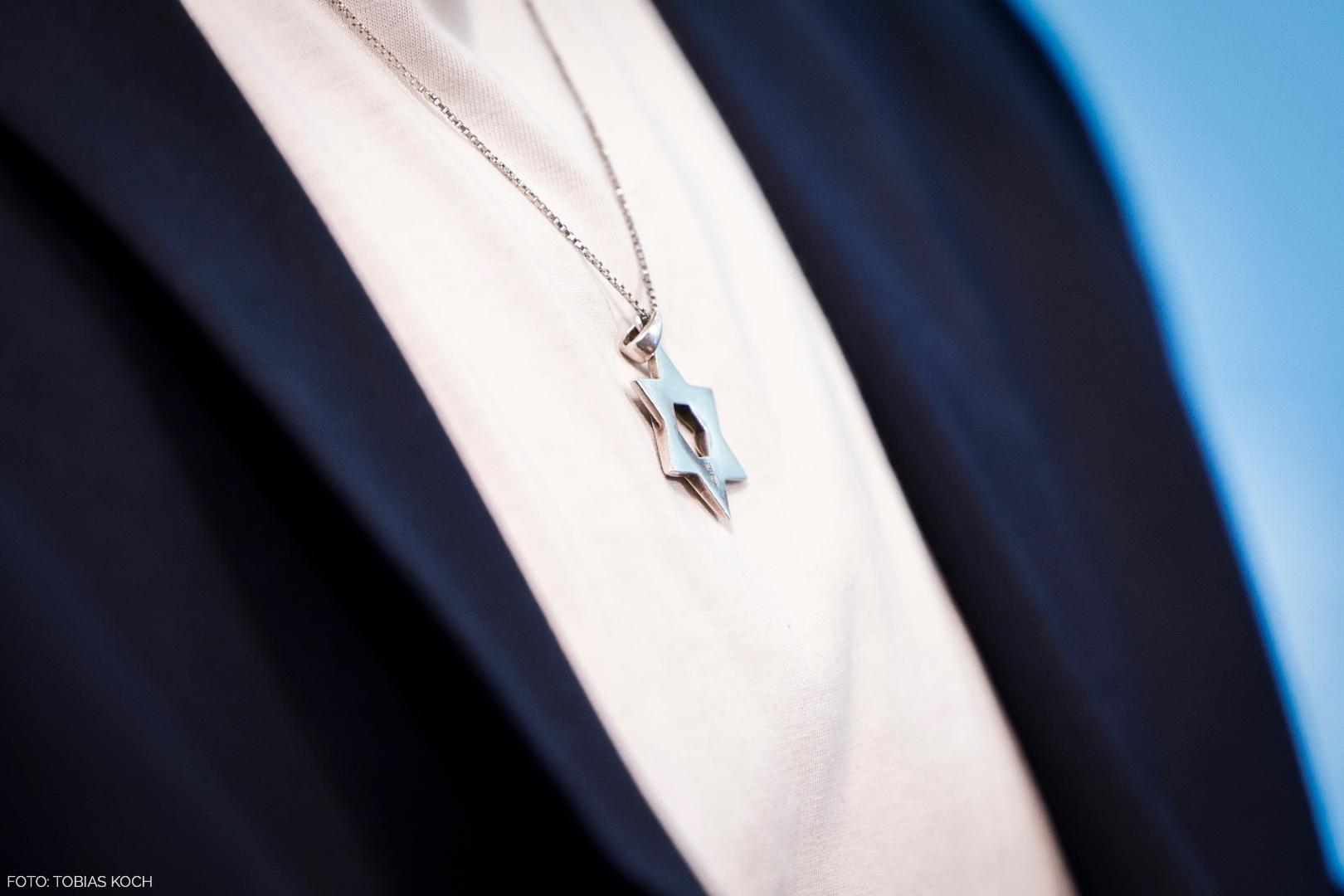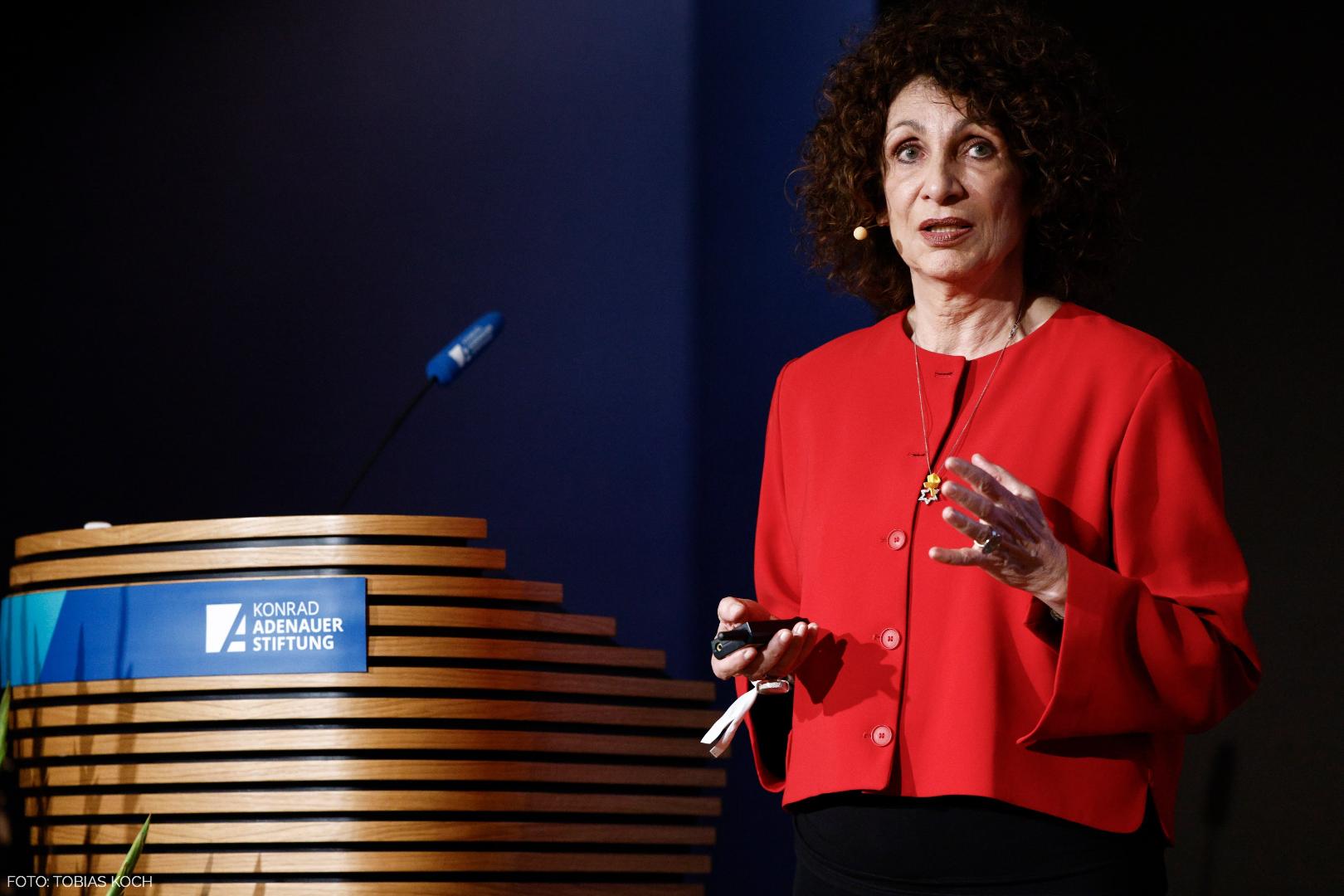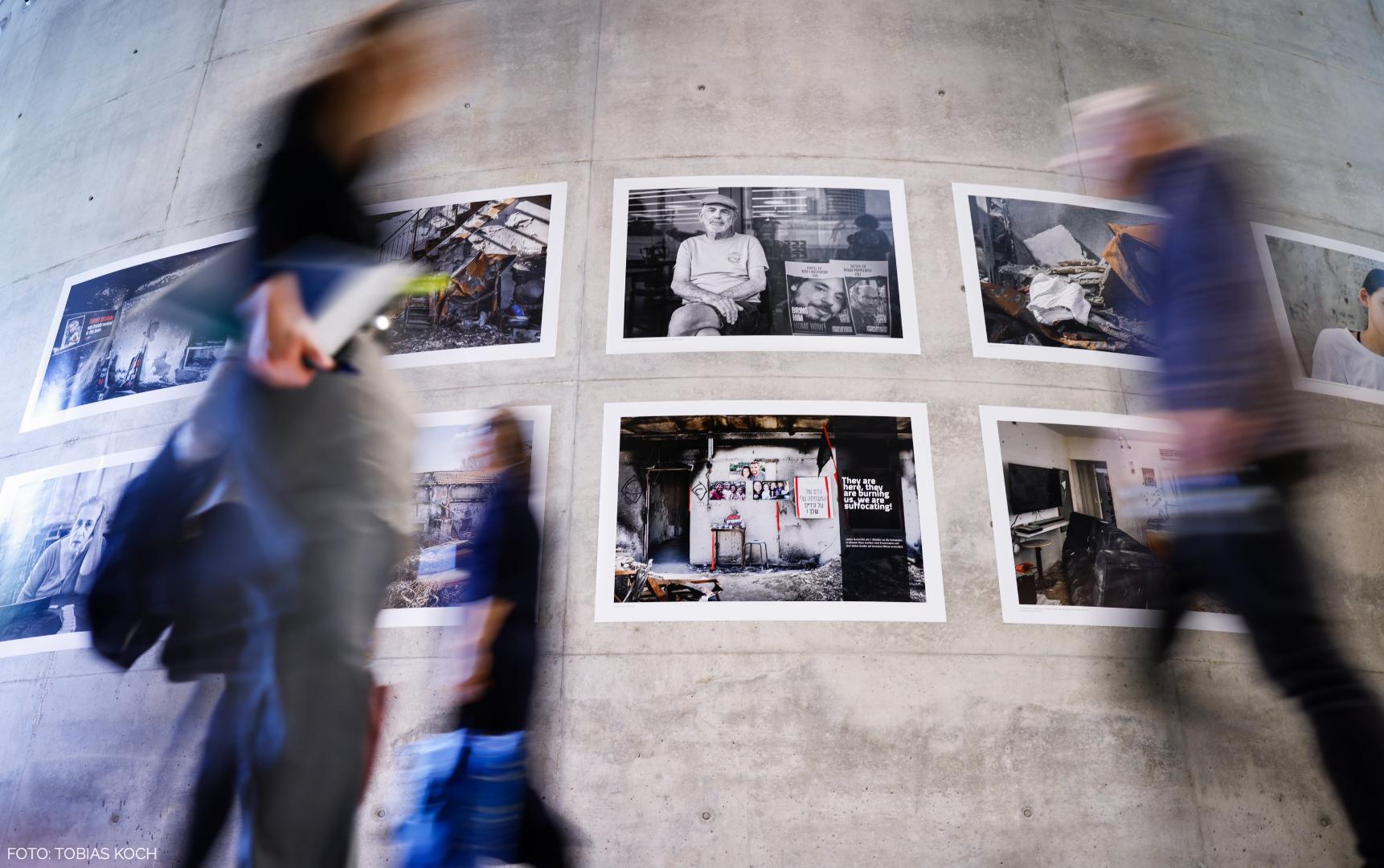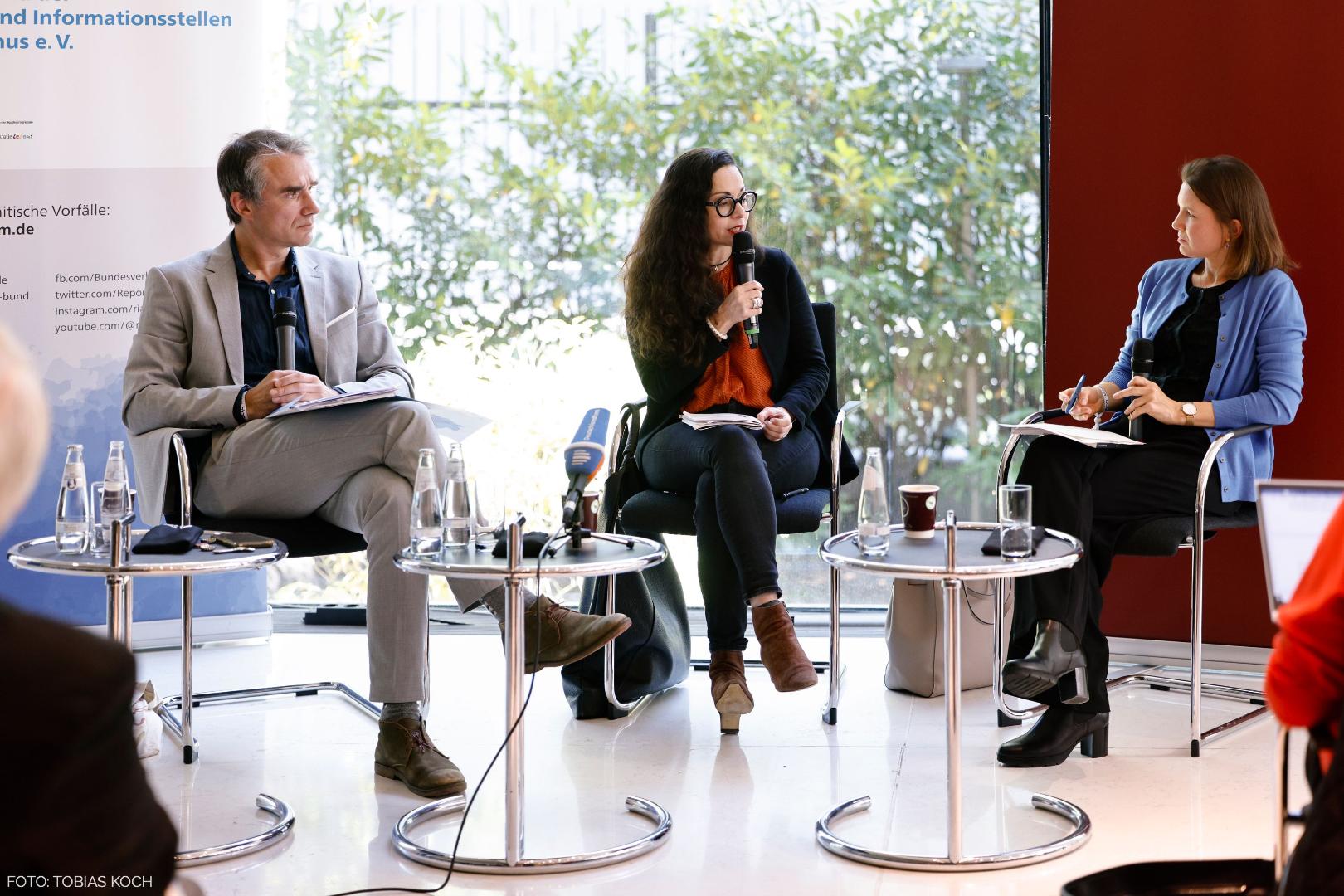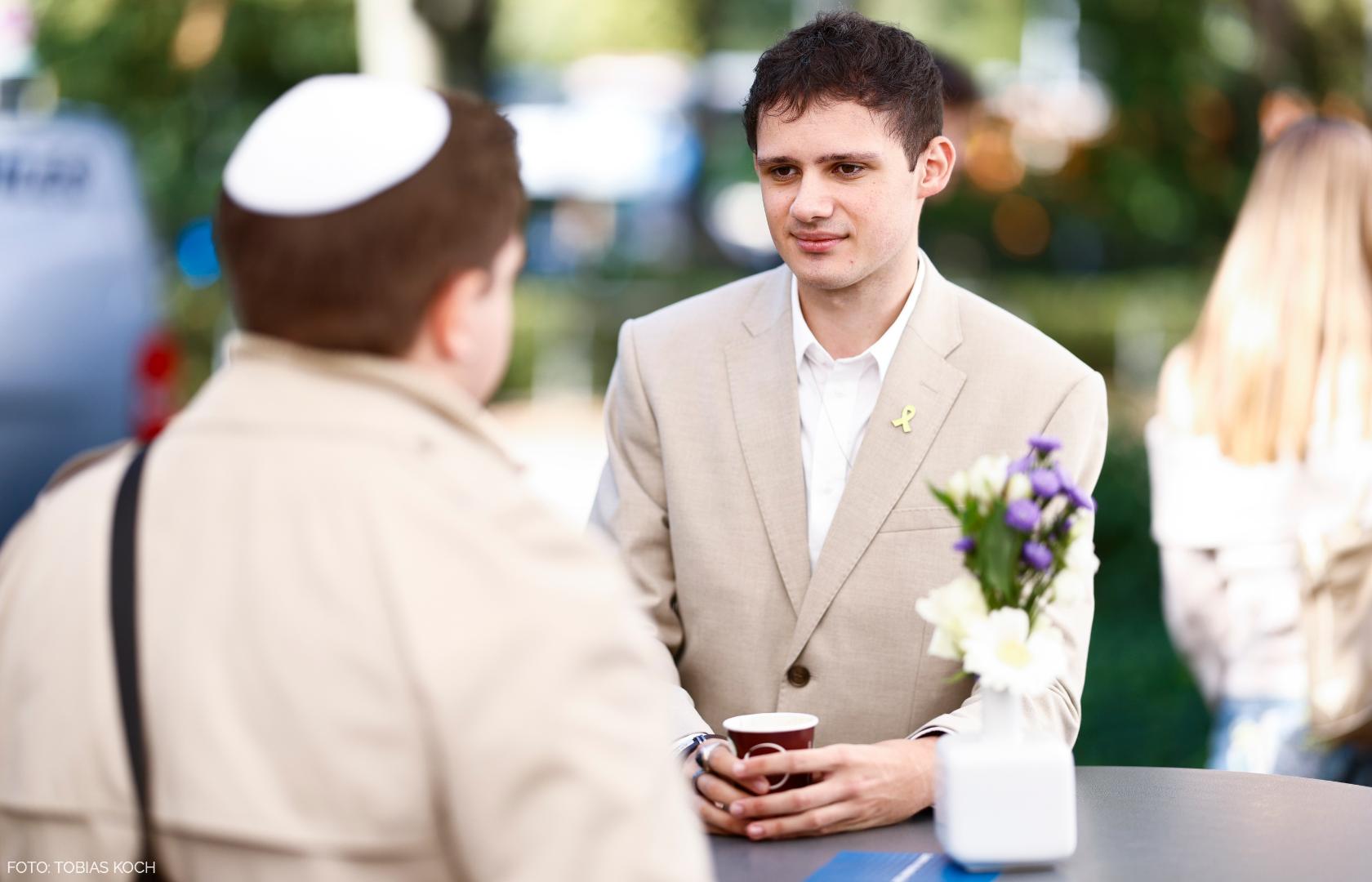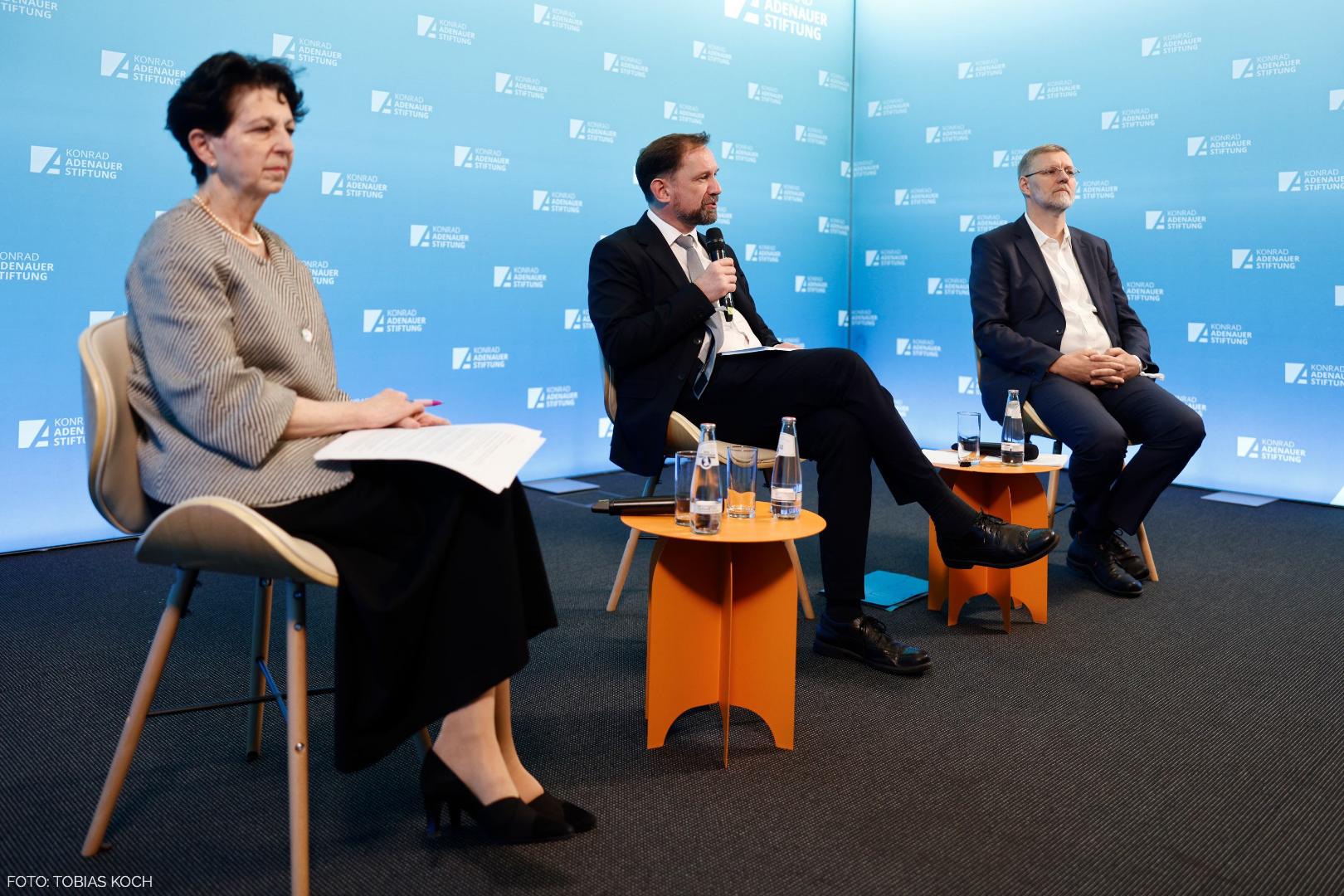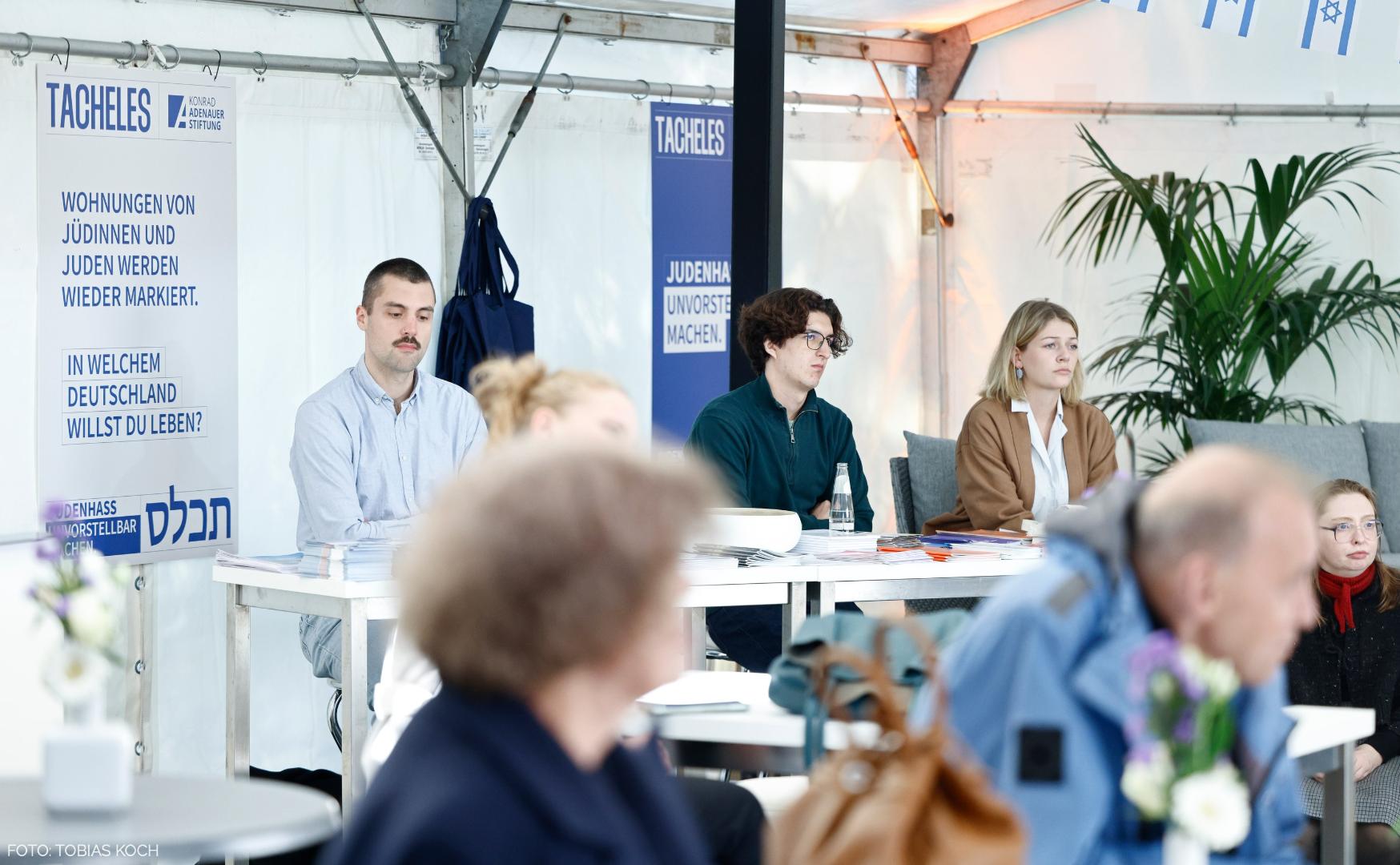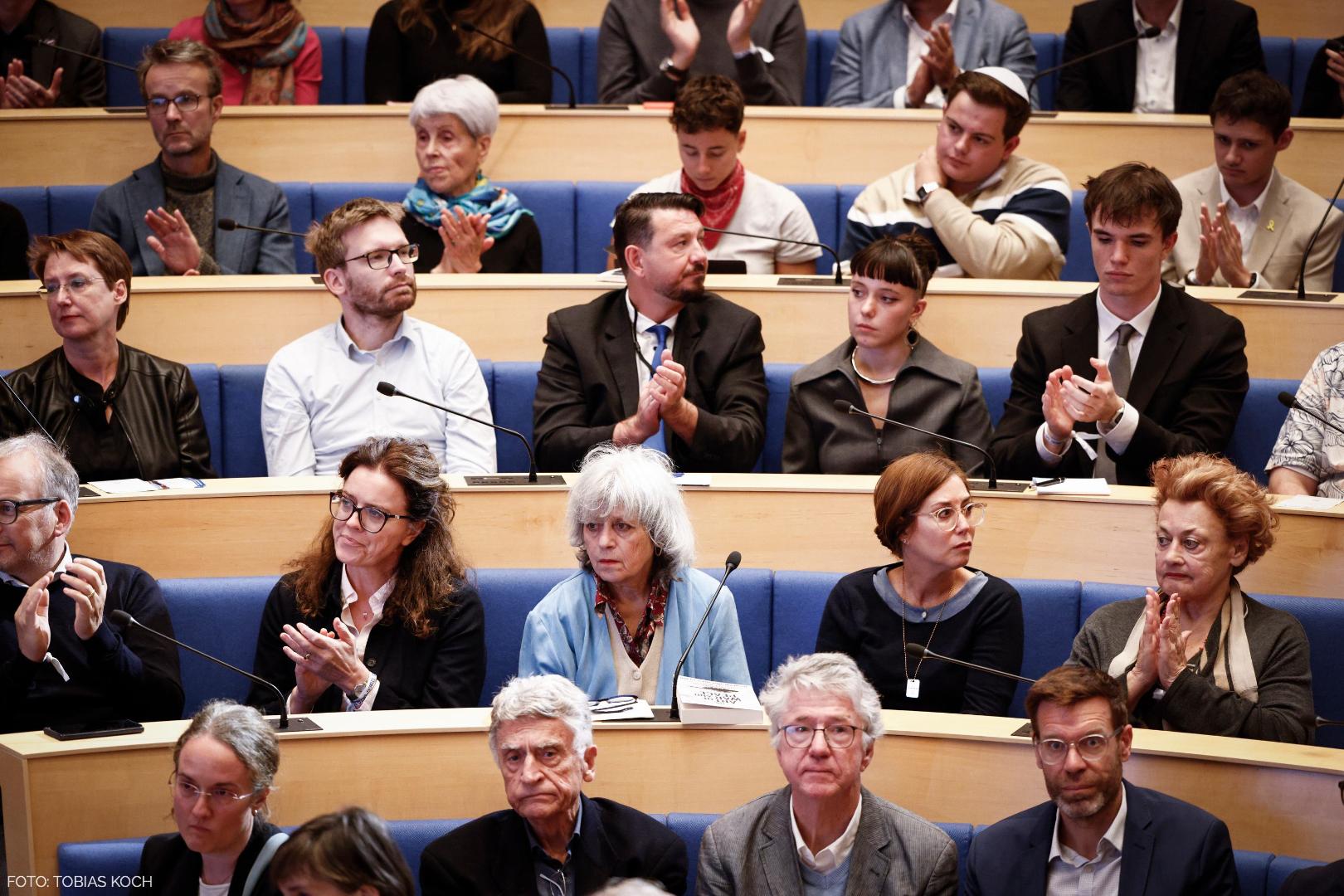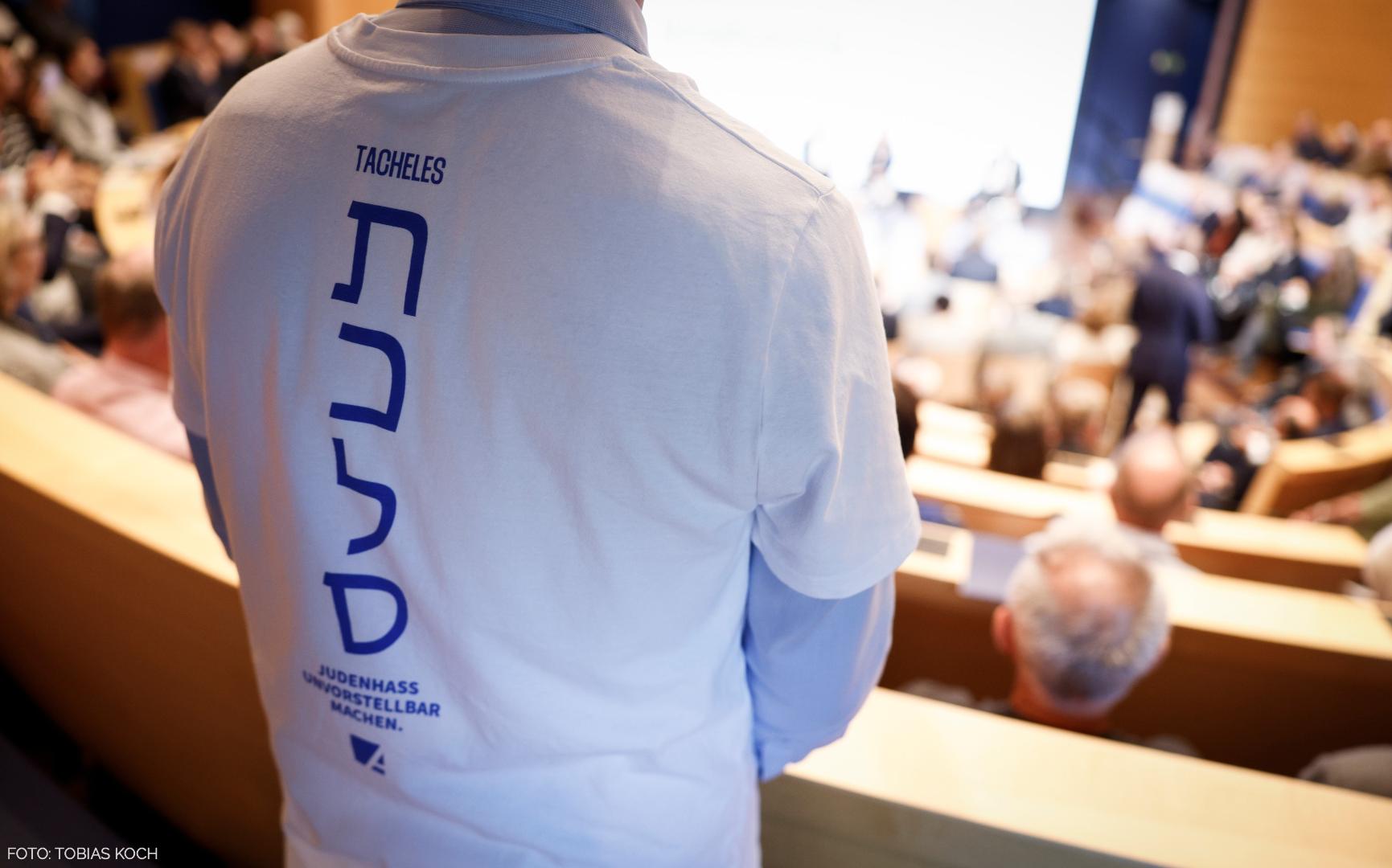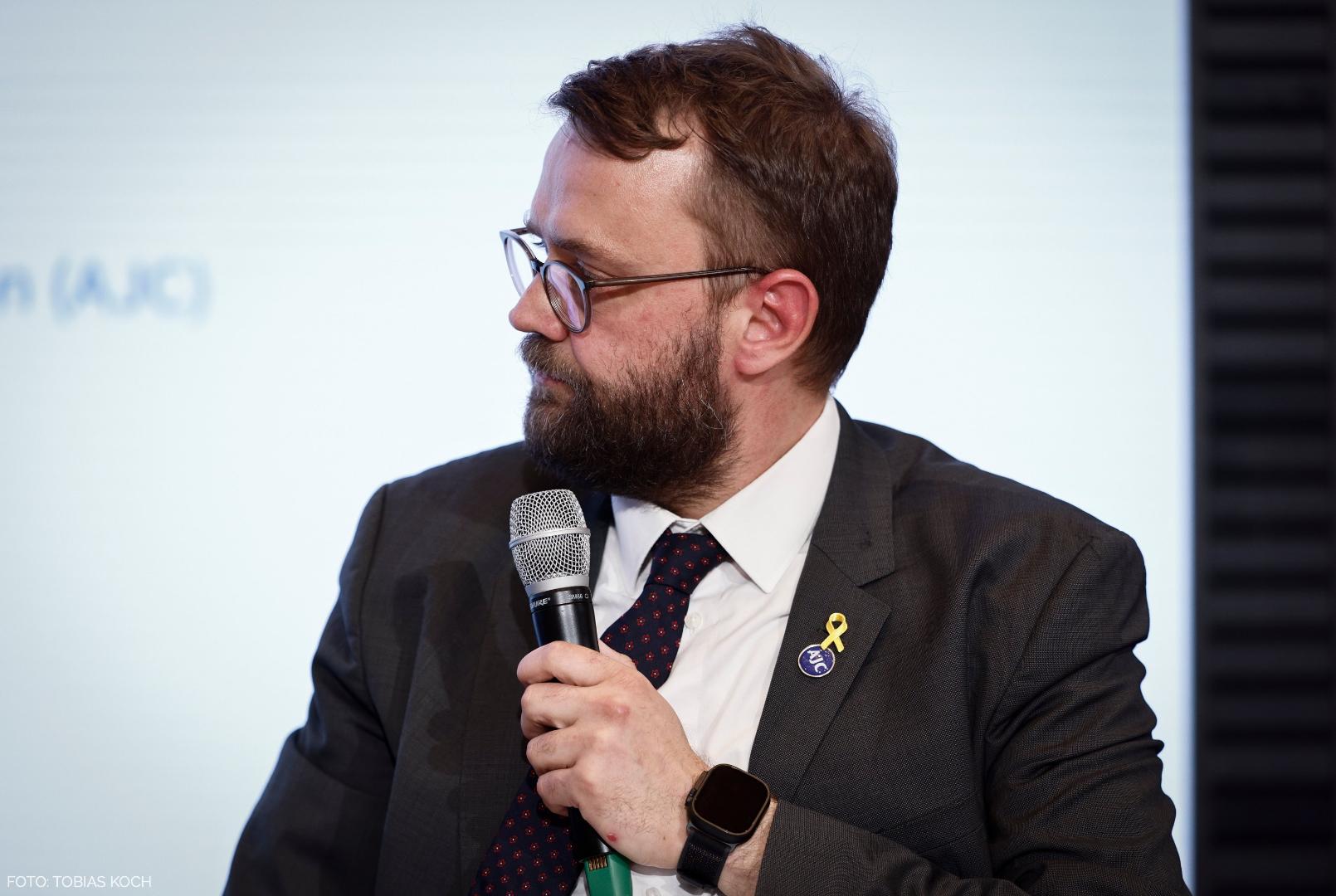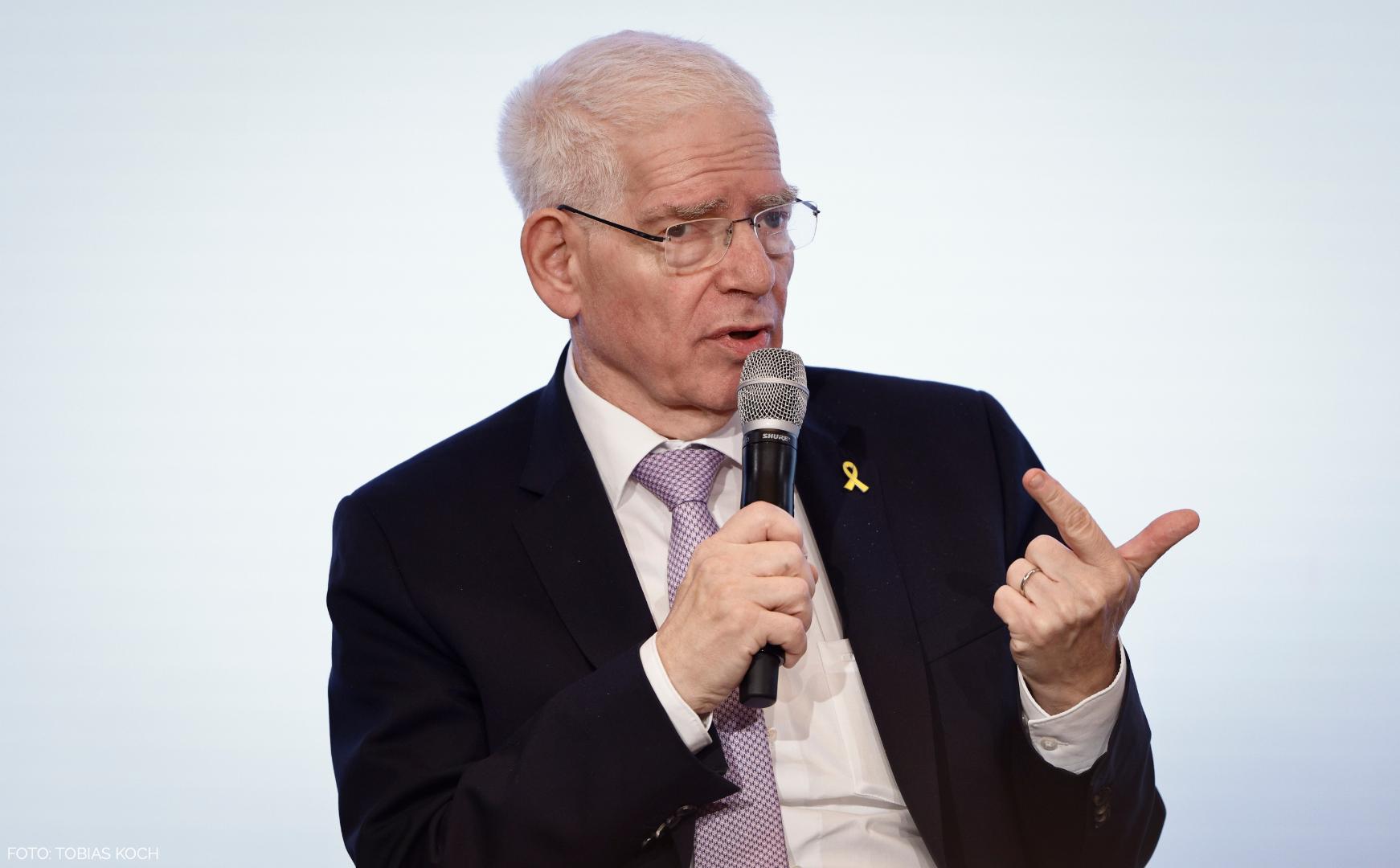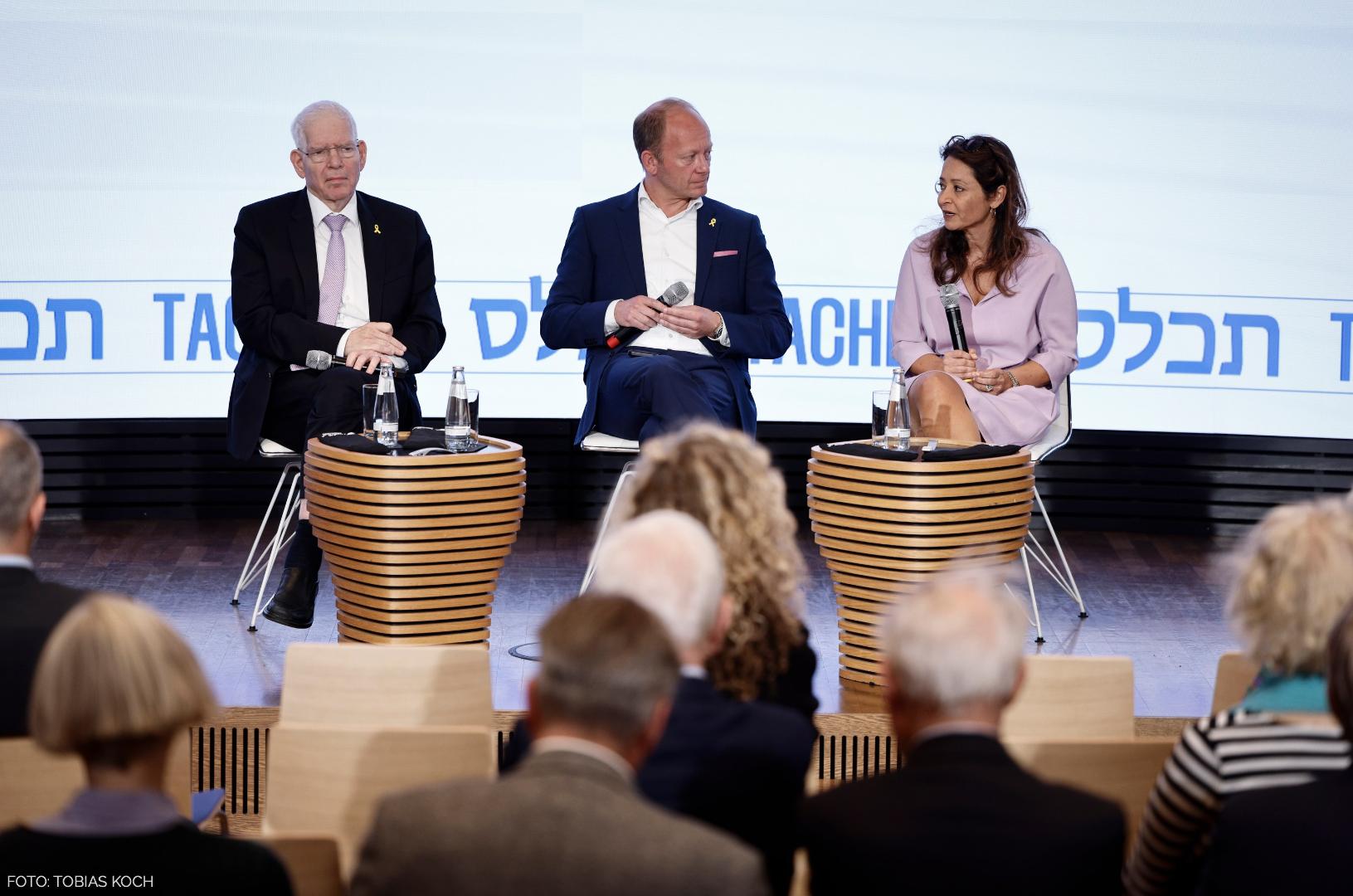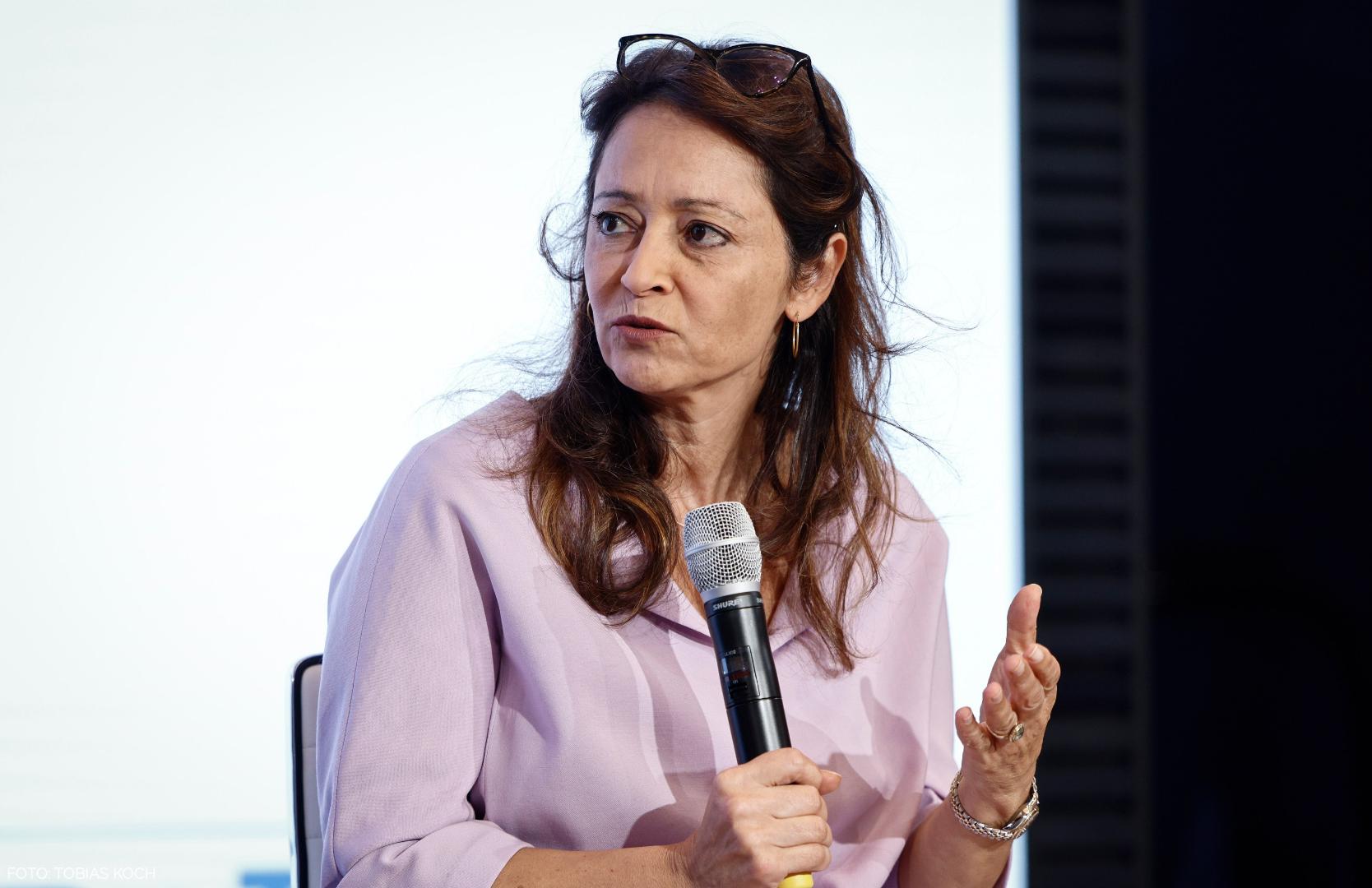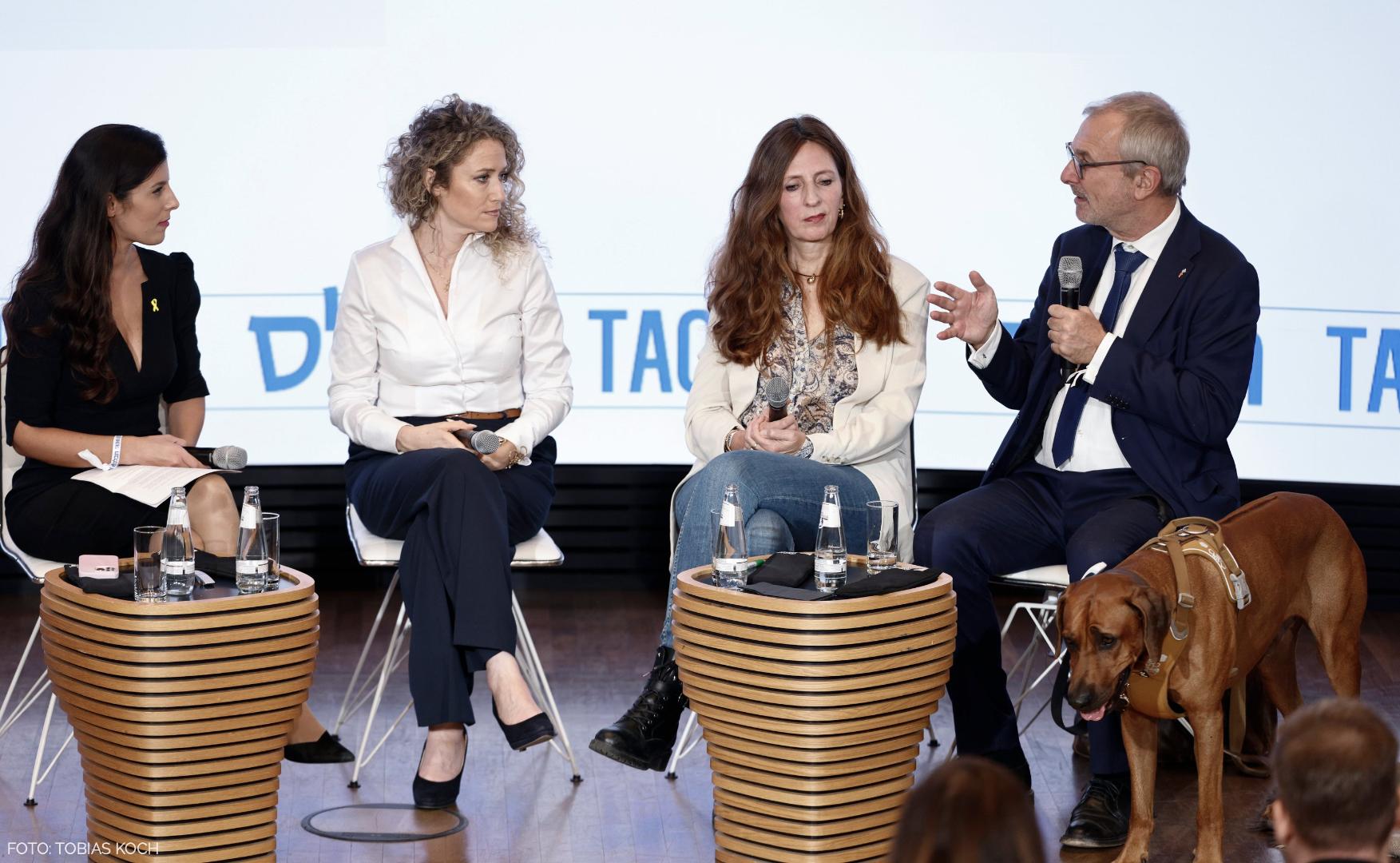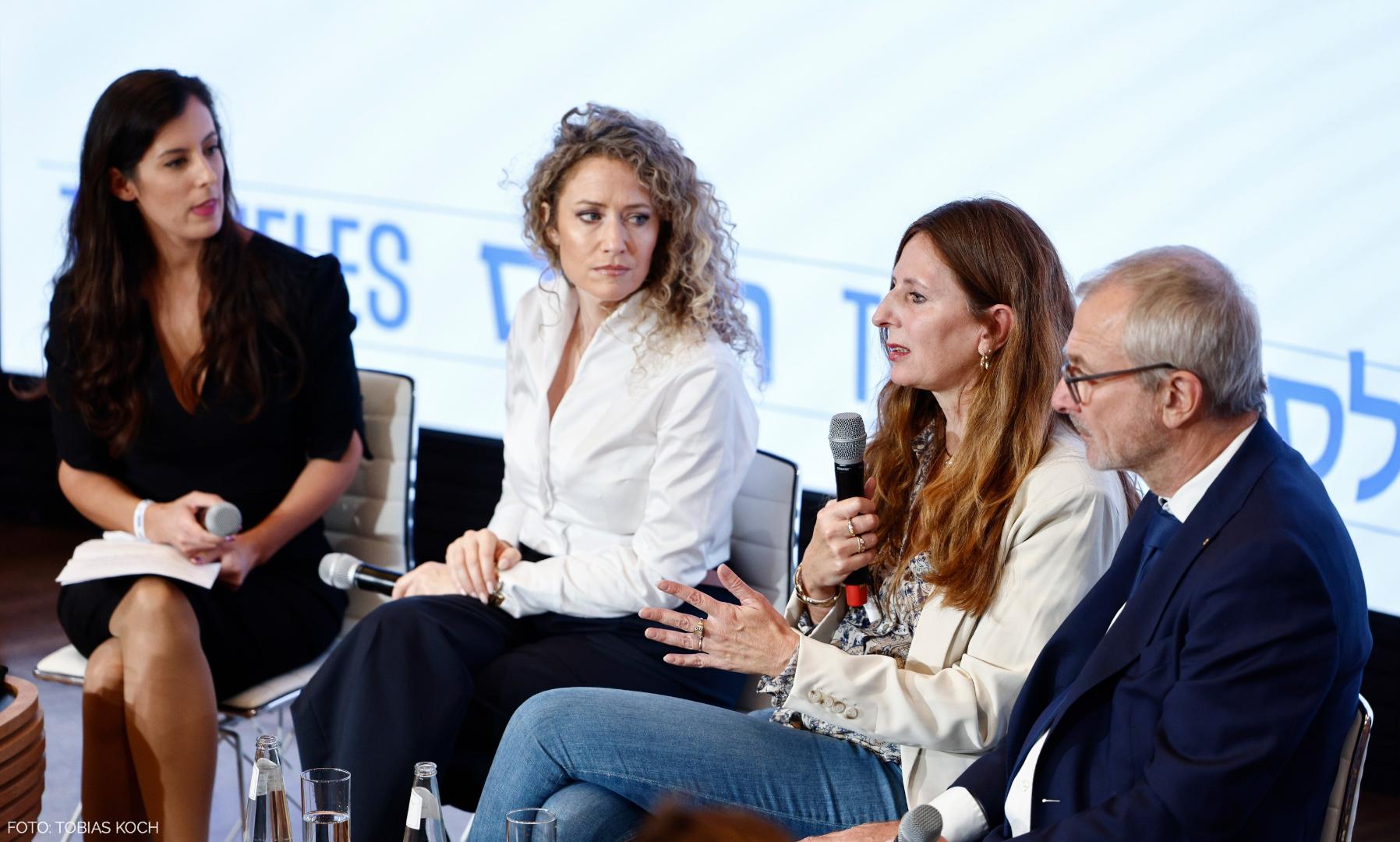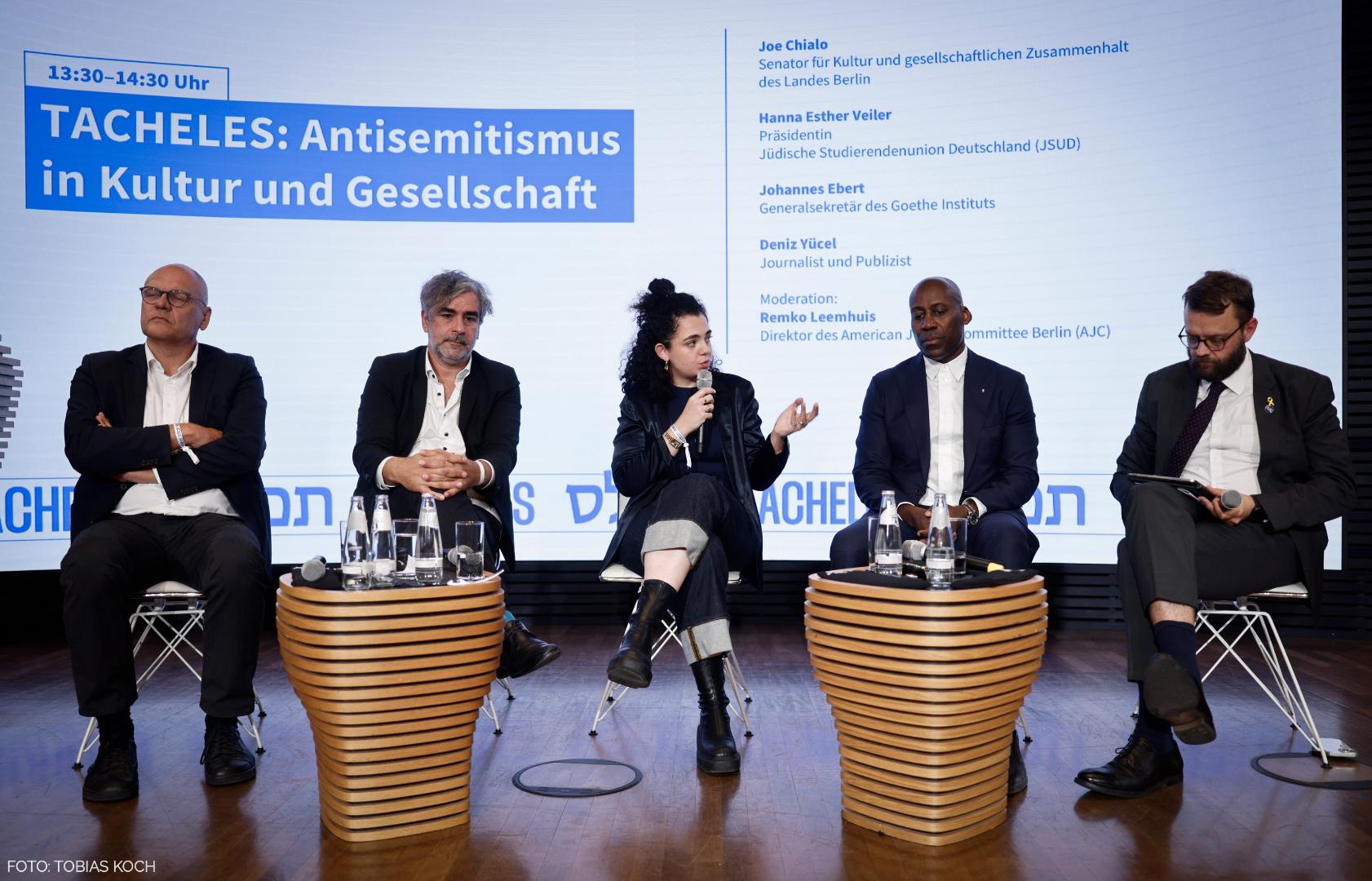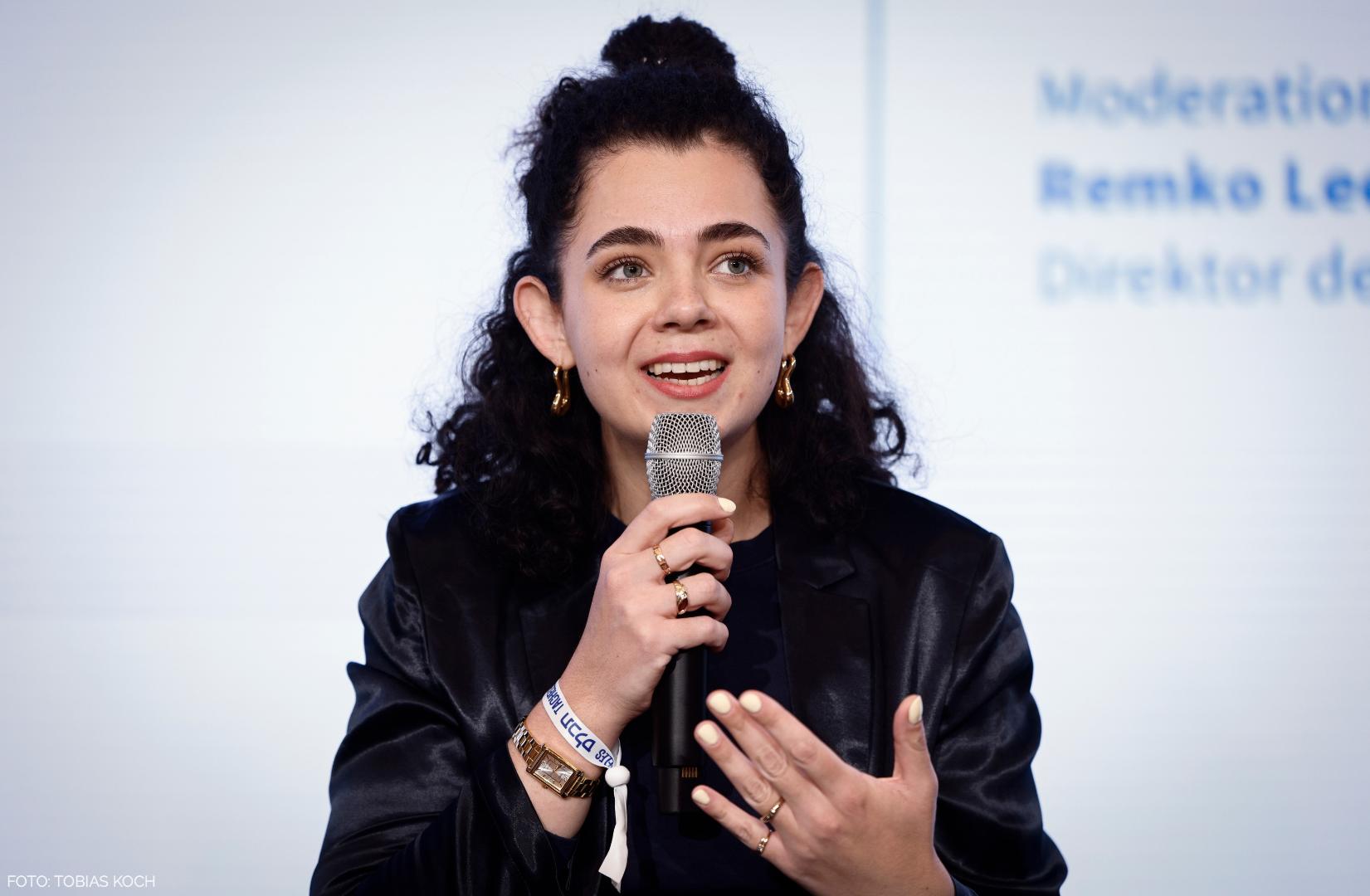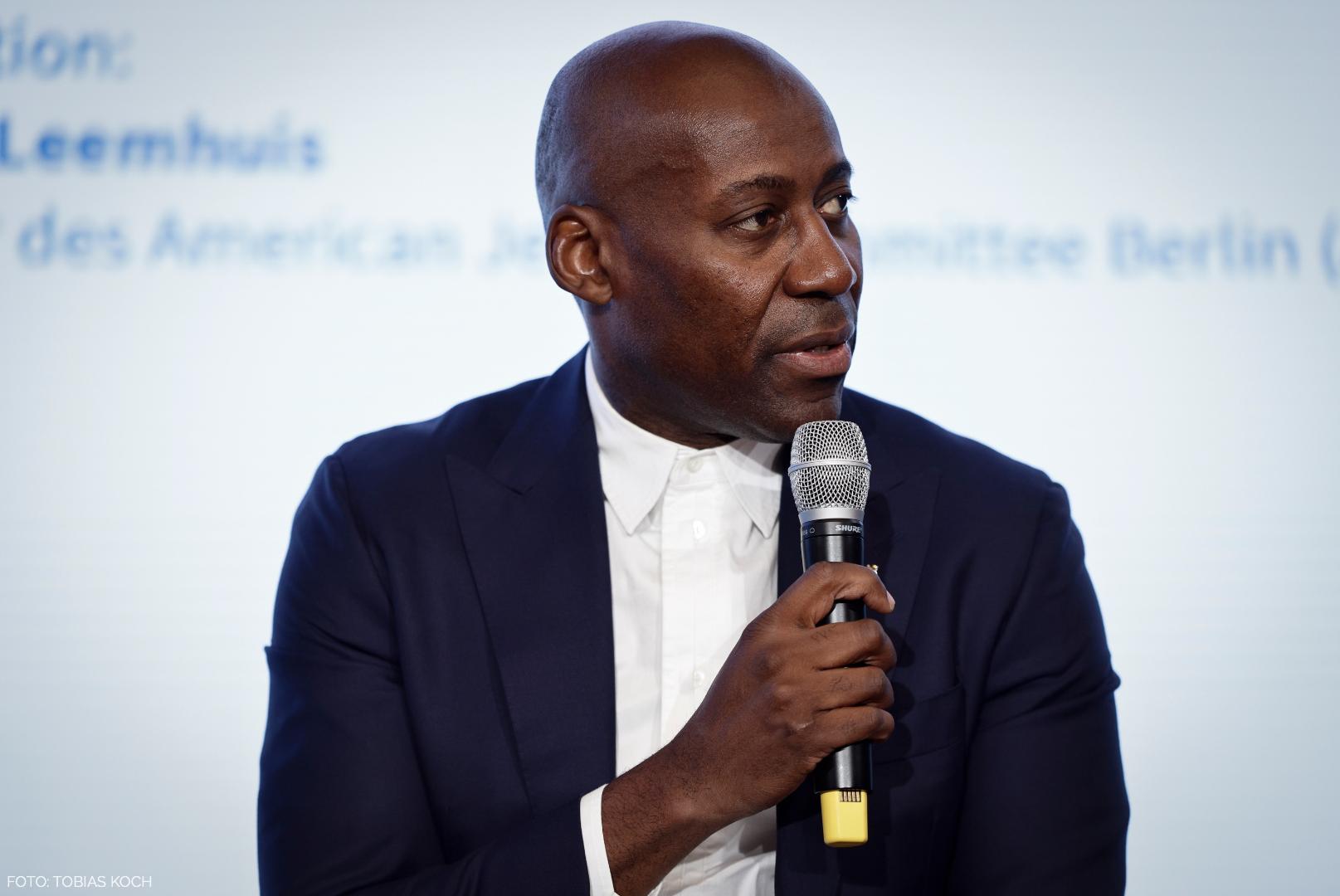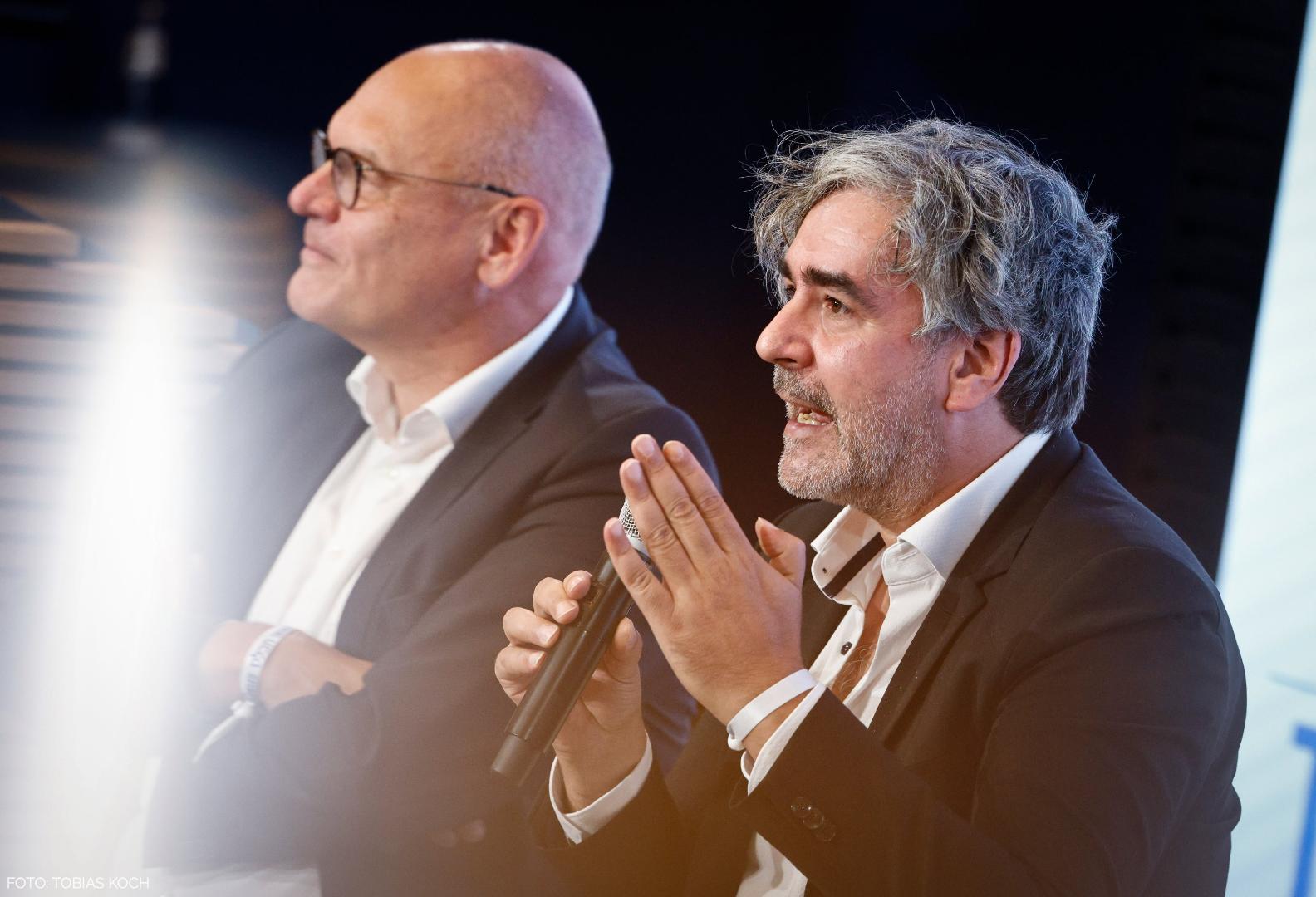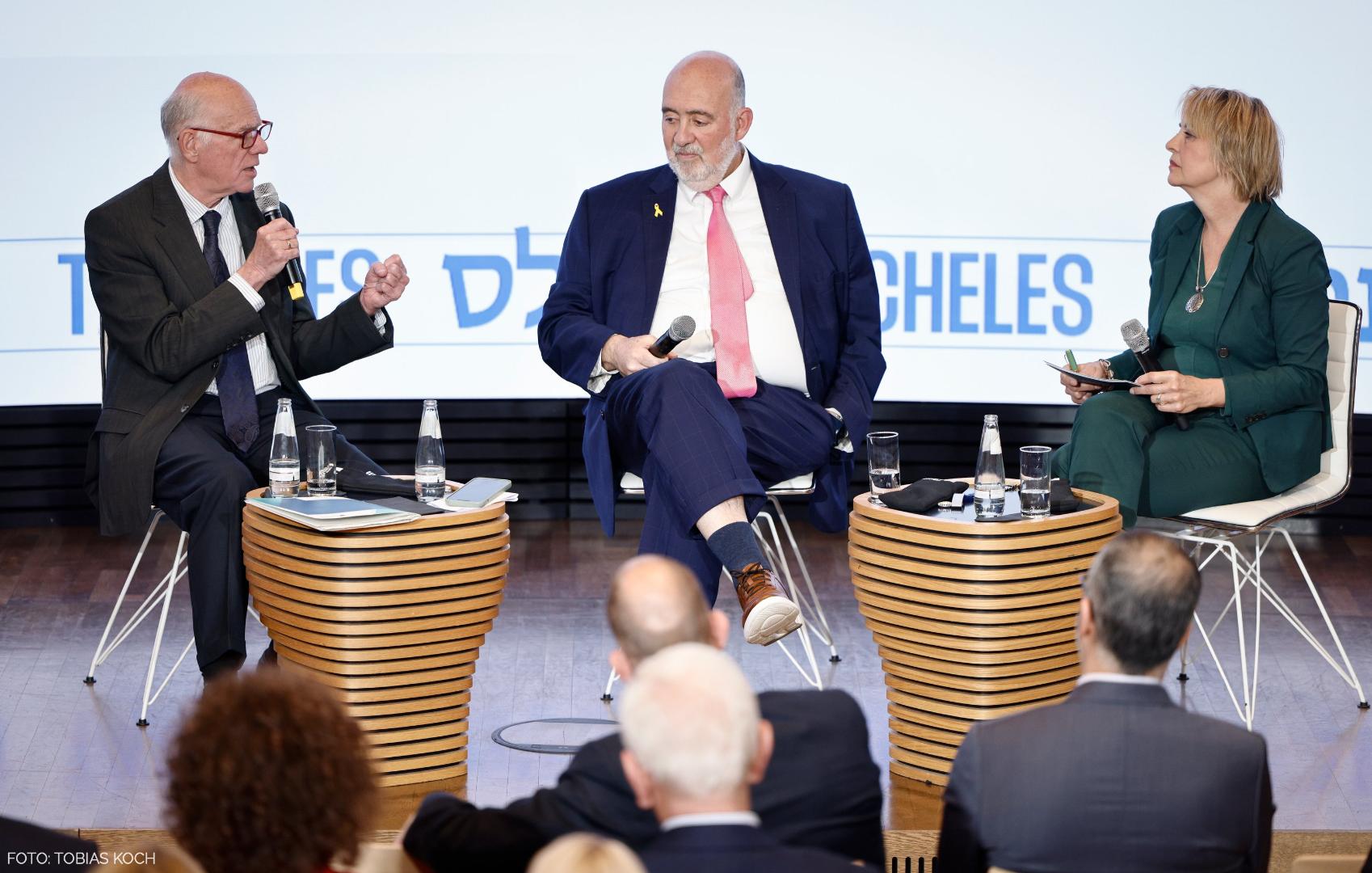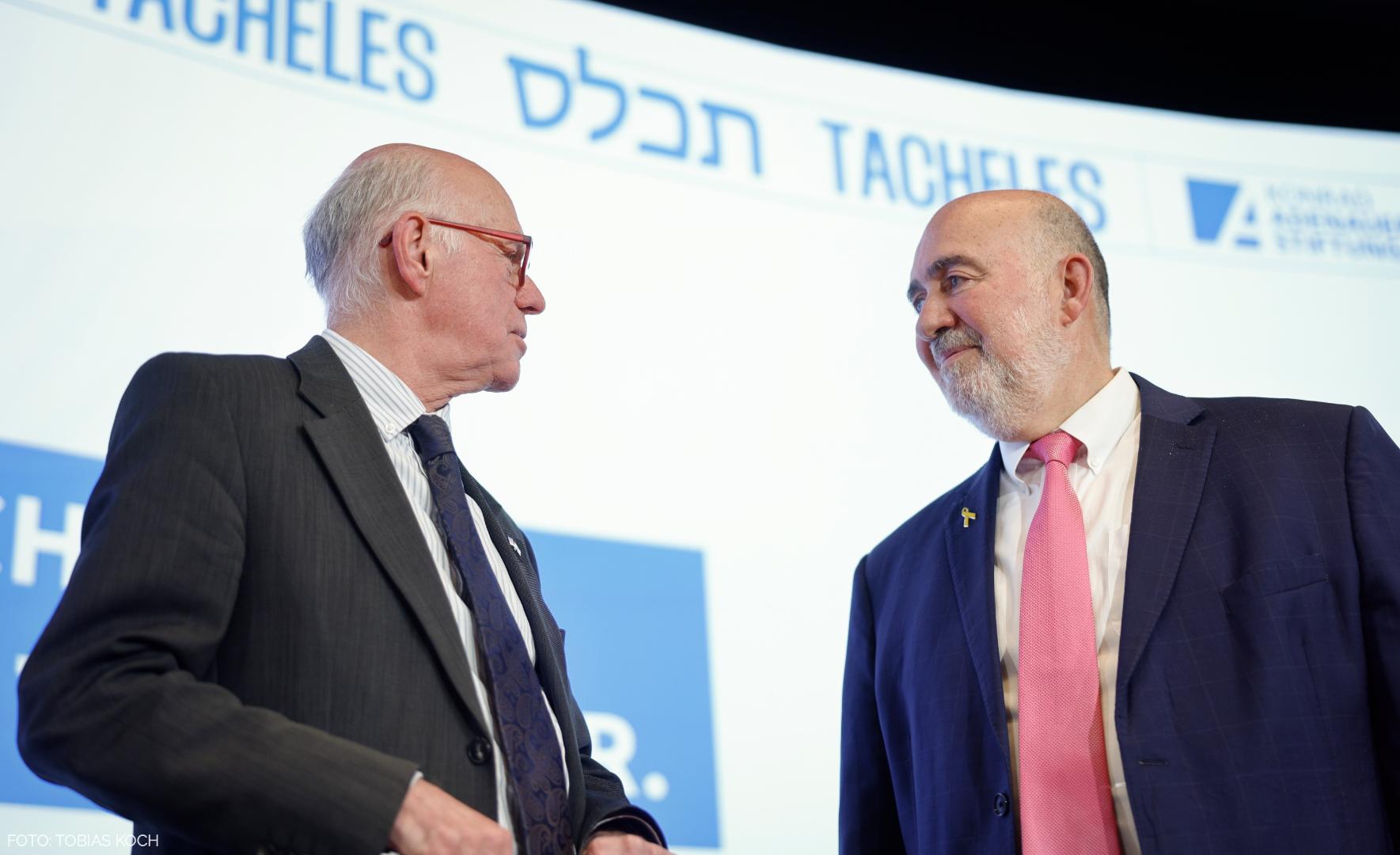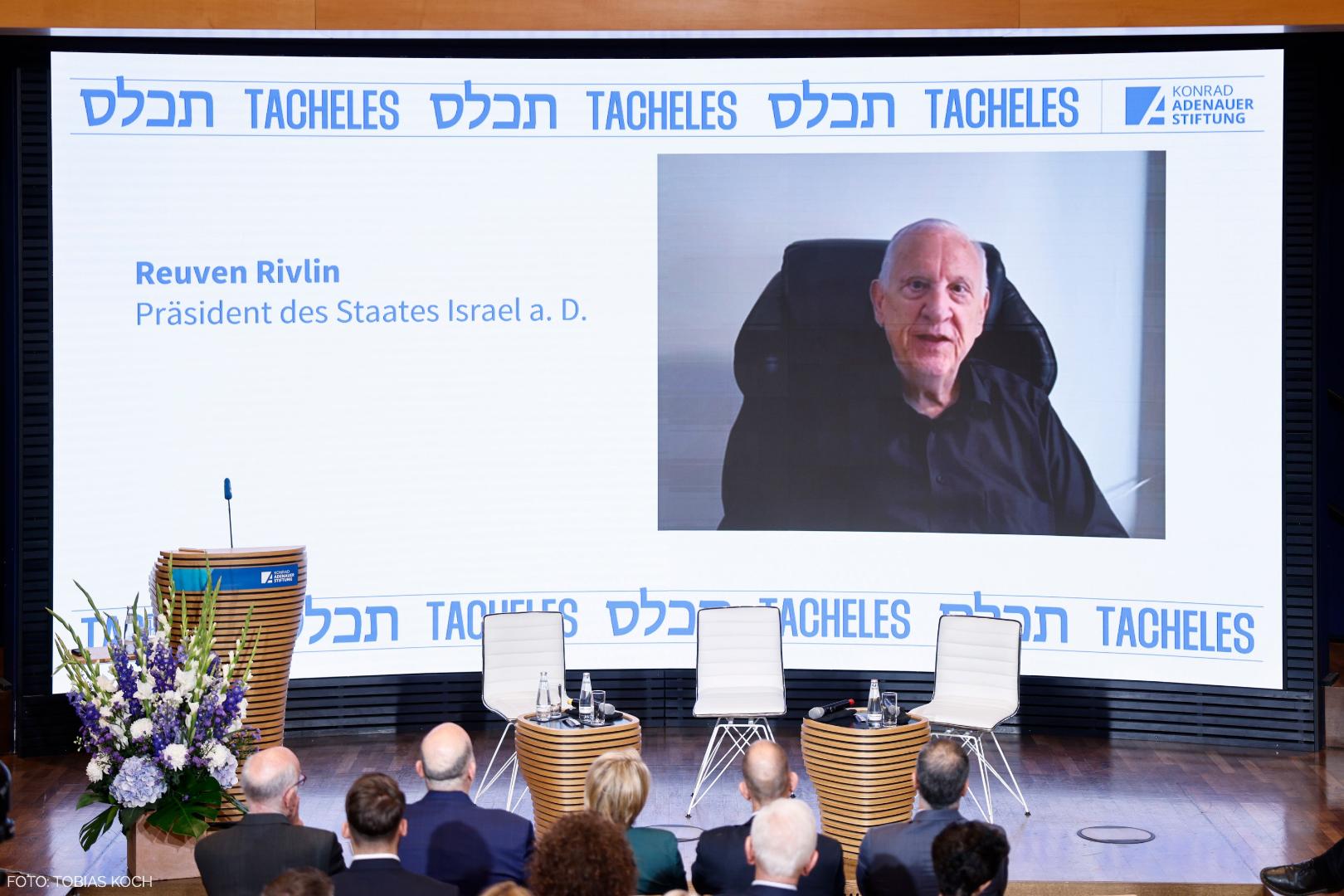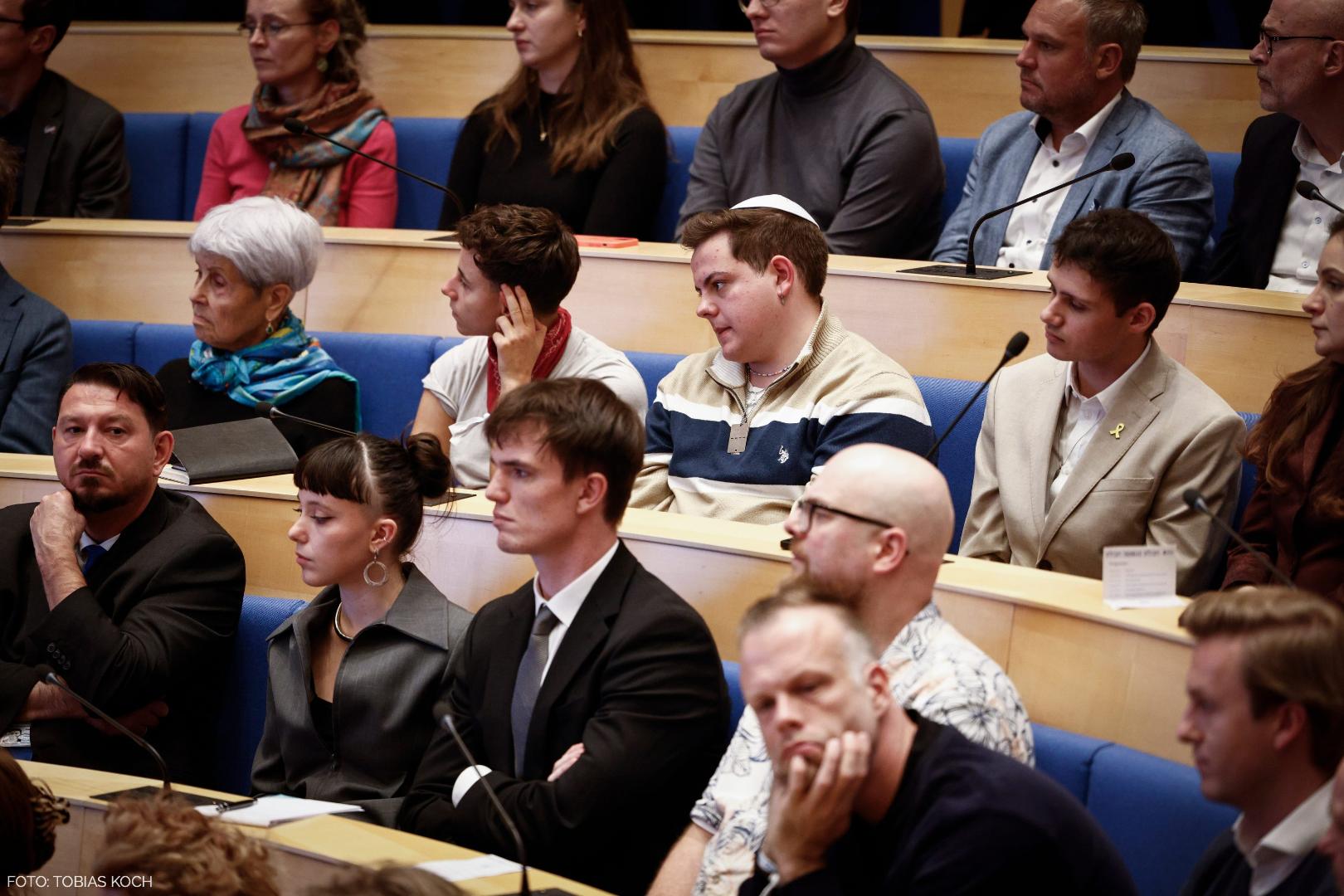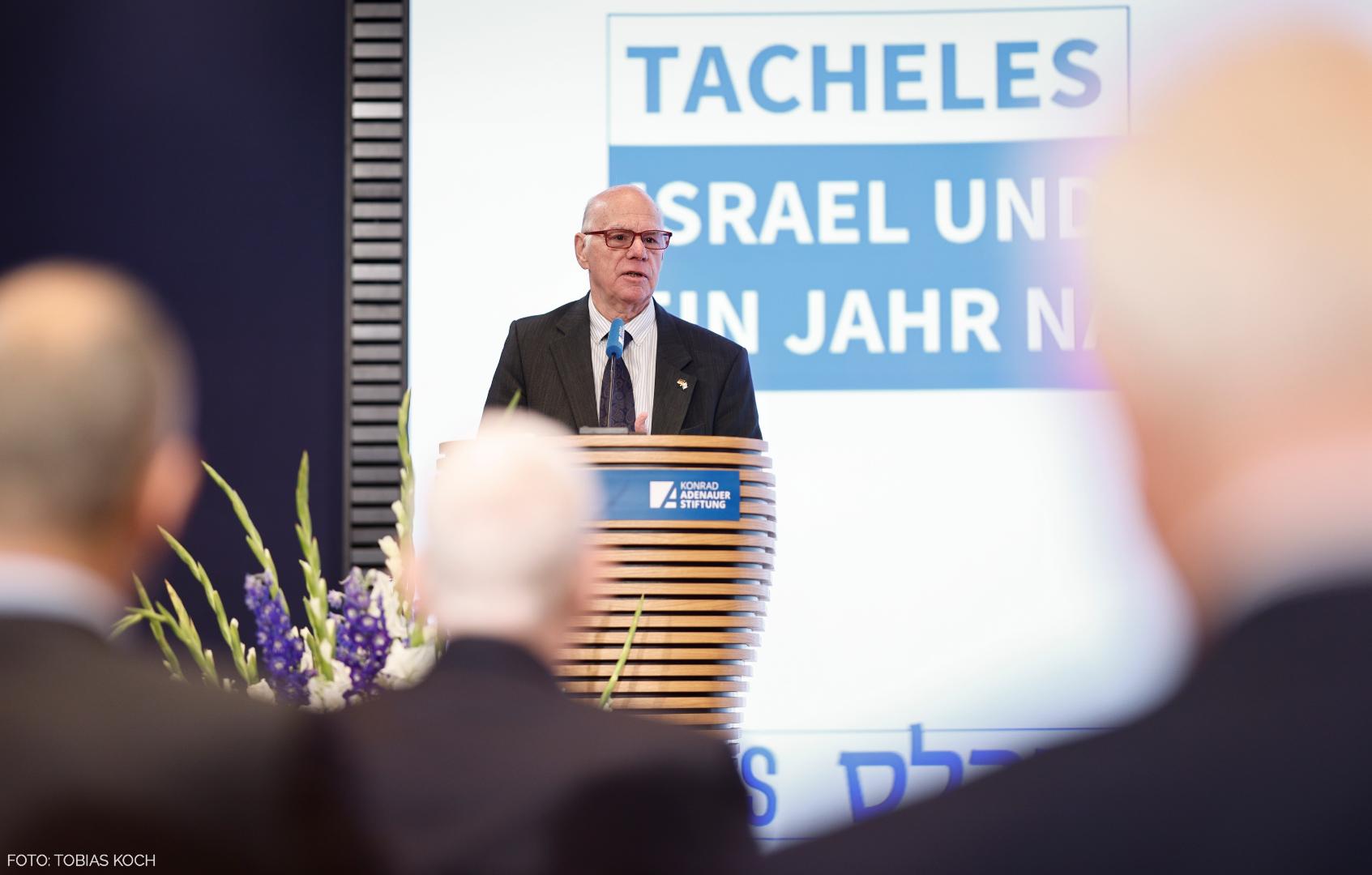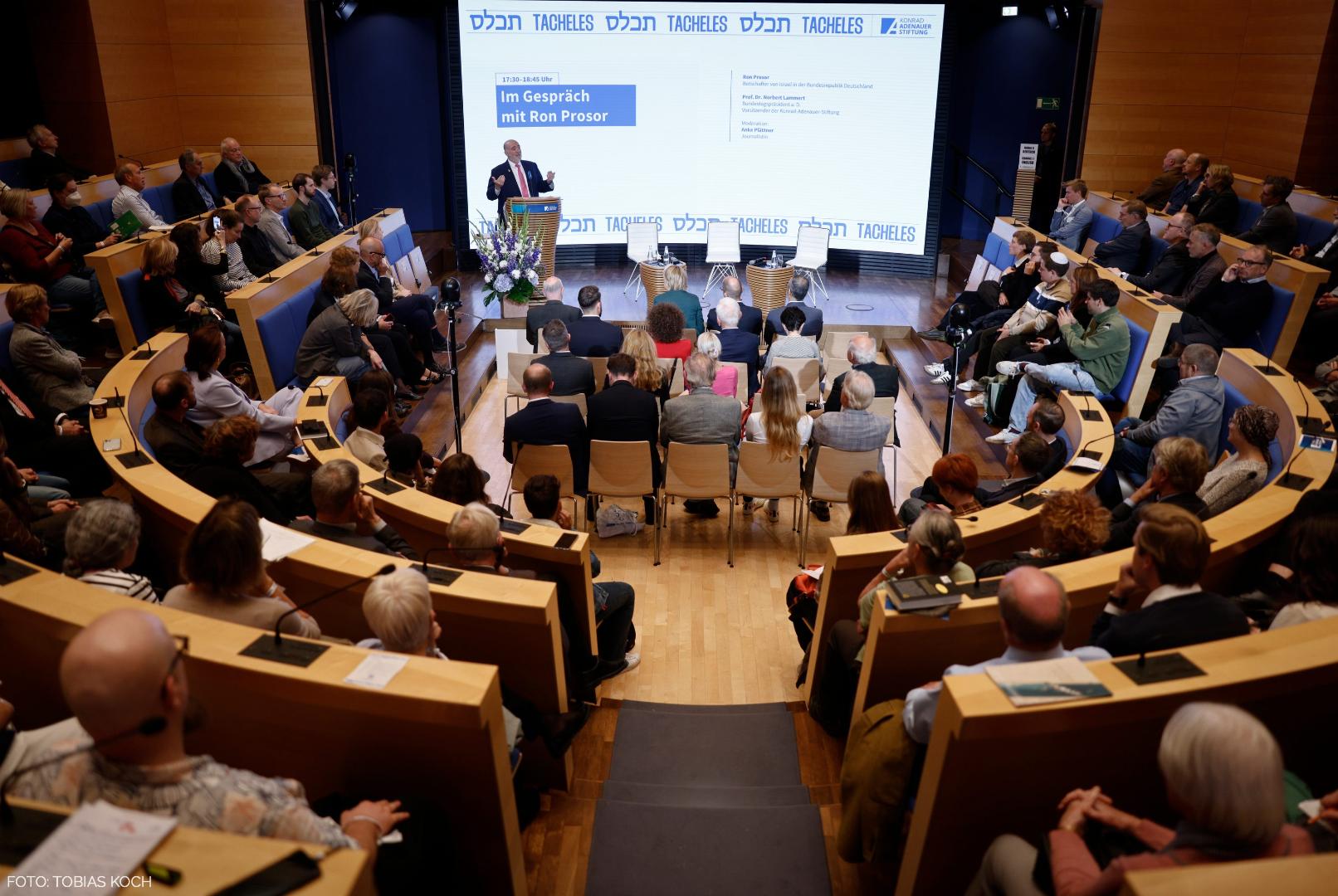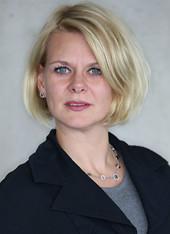‘The massacre of 7 October is beyond imagination’ - this was how Prof. Dr Norbert Lammert opened our conference ’TACHELES: Israel and Germany. One year after 7 October’. Since October 2023, the foundation has organised over 100 events on the topic of antisemitism - but this is still not enough. He underlined this with a quote from writer and Nobel Peace Prize winner Elie Wiesel: ‘Indifference is not permitted.’ In his opening speech, Lammert emphasised: ‘We are dealing with three tragedies at the same time. Firstly, the challenge to Israel's right to exist. Secondly, the unbearable humanitarian situation in Gaza and Lebanon and thirdly, the resurgence of antisemitism.’
Together with AJC Berlin, Deutsch-Israelische-Gesellschaft, ELNET, the Tikvah Institute and the Alfred Landecker Foundation, we welcomed over 600 guests, people from Israel and Germany, a school class from the Jewish high school and numerous students to set an example against hatred of Jews and antisemitism.
Ron Prosor as guest at our event
At the closing panel, Prof Dr Norbert Lammert welcomed the Ambassador of Israel to Germany, Ron Prosor, on behalf of the former President of Israel, Reuven Rivlin, who was unable to come to Berlin due to illness. In a short video message, Reuven Rivlin emphasised that antisemitism is not something that is only directed against Jews, but against humanity. Therefore: ‘Never again is now!’ Ron Prosor then gave a keynote speech. He made it clear that Israel has been ‘in a post-trauma’ since 7 October. He emphasised that commitments to Israel's security should not remain empty words. The ambassador and our Chairman then debated in a discussion moderated by journalist Anke Plättner. Lammert spoke in favour of supporting the reconstruction of Gaza, but only if there is a peace order beforehand. Ron Prosor demanded: ‘The only side that Germany can stand on is Israel's - this must be put into practice even more.’
Panel ‘TACHELES: What we need to talk about’
In the first panel of the day, Dr Josef Schuster, President of the Central Council of Jews in Germany, emphasised that politicians are fighting antisemitism ‘relatively well’. However, he could understand that it was becoming ‘increasingly difficult for the investigating authorities to combat hatred of Jews’. In Schuster's view, the term ‘reason of state‘ means standing up for Israel. ‘What I see in Germany's voting behaviour in the UN, for example, is no longer compatible with the concept of reason of state. He has been hearing ‘yes, but’ too often in political debates recently - and that worries him. For him, it doesn't matter whether antisemitism is motivated by Islamism, the right or the left, or whether it comes from the centre of society. For Dr Felor Badenberg, Senator for Justice and Consumer Protection in Berlin, who also sits on the board of the Konrad Adenauer Foundation, it is a disgrace ‘that Jewish institutions have to be protected in this day and age’. With regard to the debate about an antisemitism clause, she emphasised: ‘No financing of enemies of the constitution with state funds.’ The panel was moderated by Carsten Ovens from ELNET. He posed the question: ‘How do we reach young people who are mainly on TikTok?’. Addressing this is an important task of political education in the work against hatred of Jews. ‘It's not enough to watch ‘Schindler's List’ once a year,’ added Badenberg.
Panel ‘TACHELES: Antisemitism in culture and society’
How widespread is antisemitism in the cultural sector and at German universities? In the second panel, Joe Chialo, Senator for Culture and Social Cohesion of the State of Berlin, Hanna Esther Veiler, President of the Jewish Student Union Germany, Johannes Ebert, Secretary General of the Goethe Institute, and Deniz Yücel, journalist and publicist, posed this question under the moderation of Remko Leemhuis, Director of the AJC Berlin. ‘A city like Berlin, which is a space for freedom, has become more of a space for pain,’ Joe Chialo stated. He himself has been targeted by pro-Palestinian activists for many weeks. Recently, his private residence was smeared with calls for violence. Hanna Esther Veiler also reported: ‘The question of whether I have a future here as a young Jewish person has been asked more and more since October 7th. At the same time, she called for more solidarity: ‘Jews cannot fight this battle alone.’ The antisemitism clause, which was promoted by Joe Chialo, was discussed controversially: ‘Taxpayers’ money must not be made available to anti-democrats,’ Chialo emphasised. Welt journalist Deniz Yücel, who is also a co-spokesperson for Pen Berlin, emphasised the need for ‘a precise inventory of where problems exist, for example at universities’. However, he does not share the view that ‘the cultural sector is silent’, as many clear statements were made early on. Johannes Ebert, Secretary General of the Goethe-Institut, brought a global perspective to the discussion. For him, one of the Institute's main tasks is to continue the dialogue. Germany's position in this situation must be explained. It is also necessary to talk to people who see Israel and Germany differently than we do. Ebert also spoke out against an antisemitism clause, which would only lead to uncertainty among institutions locally and abroad.
Panel ‘TACHELES: How October 7th changed Israel’
What consequences did the Hamas attack have for Israeli society? The third panel discussed this. Ricarda Louk, whose daughter Shani was murdered by terrorists at the Nova Festival on 7 October 2023, made it clear: ‘The whole year was a day of remembrance. We are still in the middle of it. Nothing is over.’ For Volker Beck, Managing Director of the Tikvah Institute and President of the German-Israeli Society, the question of Israel's security is central: ‘If you are committed to Israel and stand by it, you have to act accordingly. ‘He made it clear: ‘You can't defend Israel's security without stepping on someone's toes.’ Dr Melody Sucharewicz, political communications and strategy consultant, agreed: ‘The fight goes on. There are still 101 hostages in the hands of Hamas. We know that Israel is not only fighting for Israel, but for the entire free world.’ Israel is caught in an irresolvable conflict of interest: on the one hand, the government has a duty to free the hostages, on the other hand, the civilian population must be protected.
Art and interactive workshops
In addition to the panel discussions, various thematic and interactive workshops took place. There were also various cultural activities. In a graffiti workshop, pupils from the Moses Mendelssohn Jewish High School worked with Mark Marquardt (‘Akte One’) to design a canvas with hopes and wishes for the future on the topic of antisemitism, which they then presented in the academy.
The pictures by photographer Halina Hildebrand, which were on display in the foyer of our academy, also showed that 7 October 2023 was a turning point. On display: Destroyed residential buildings, piled-up car wrecks, people with empty, powerless faces - snapshots from a wounded country. In her moving talk, she spoke about the background to her exhibition and her encounters on site.
What antisemitic myths are there? And what is the story behind them? The historian Prof Dr Thomas Brechenmacher from the University of Potsdam and Deidre Berger from the Tikvah Institute spoke about this in a workshop. Brechenbacher explained the connection between Zionism and antisemitism, discussed the founding of Israel, the two-state solution, aspects of the Holocaust and the differences between racism and antisemitism. Deidre Berger commented on socio-economic antidemitism stereotypes, Jews in the US election campaign and accusations of colonialism.
In its workshop, moderated by Lena Altmann (Co-CEO), the Landecker Foundation presented numbers on the recording of antisemitic incidents and the counselling of victims since 7 October. Both are at a record high (5,000 antisemitic cases in 2023; an increase of 50 per cent on the previous year according to RIAS). Benjamin Steinitz, Managing Director of the Federal Association of Research and Information Centres on Antisemitism, and Marina Chernivsky, Head of the Competence Centre for Education and Research Critical of Antisemitism and Managing Director of OFEK, provided information on current challenges and the needs of reporting centres and victim counselling. The high increase in antisemitic incidents was partly due to 7 October, as certain groups ‘specifically called for violence against Jews in Germany’ in the aftermath, said Steinitz.
Jewish students gave insights into their everyday lives in the workshop ‘No Safe Space?’. They reported on specific antisemitic attacks that they had experienced themselves. These included verbal attacks, but also physical attacks. It became clear that there is no ‘safe space’ at many universities in Germany and that Jewish students currently even have to attend lectures with personal protection in some cases.
Prof Dr Norbert Lammert concluded by expressing his thanks for the great response on site. The event was proof that ‘in difficult situations and times, we can speak our minds peacefully’, because: ‘Indifference is not allowed.’
Topics
Provided by
Foundation Office Israel
About this series
The Konrad-Adenauer-Stiftung, its educational institutions, centres and foreign offices, offer several thousand events on various subjects each year. We provide up to date and exclusive reports on selected conferences, events and symposia at www.kas.de. In addition to a summary of the contents, you can also find additional material such as pictures, speeches, videos or audio clips.
